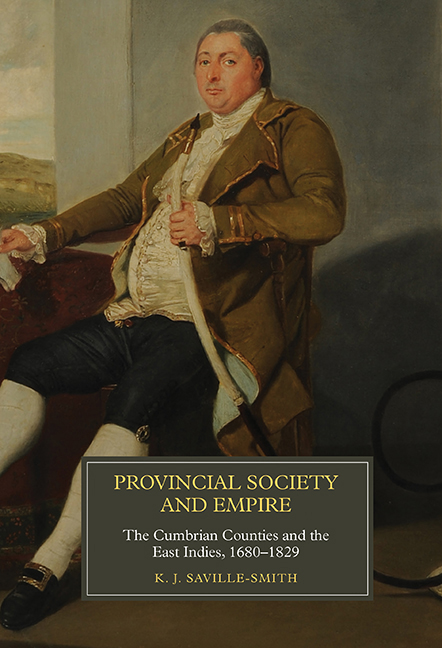Book contents
- Frontmatter
- Contents
- List of Illustrations
- Acknowledgements
- List of Abbreviations
- Glossary
- Chapter 1 The Provincial World and Global Encounters
- Chapter 2 Cumbrian Contexts, Patterns and Lives
- Chapter 3 Why Go to the East Indies?
- Chapter 4 ‘Passage to India’
- Chapter 5 Returning and Returns
- Chapter 6 Conclusion: ‘Use of Globes’
- Appendix A East Indies Enumerated Cumbrian Men
- Appendix B East Indies Enumerated Cumbrian Women
- Appendix C East Indies Women, Associated Cumbrian Men and Their Children
- Appendix D Hudleston, Kin Connections and the East Indies
- Appendix E East Indies connections of the Winders, Stephensons and Fawcetts
- Appendix F East Indies connections of the Braddylls, Wilsons and Gales
- Appendix G Kin Connections of Catherine Holme
- Appendix H Kin Connections of Thomas Cust
- Bibliography
- Index
- Miscellaneous Endmatter
Chapter 6 - Conclusion: ‘Use of Globes’
Published online by Cambridge University Press: 18 April 2018
- Frontmatter
- Contents
- List of Illustrations
- Acknowledgements
- List of Abbreviations
- Glossary
- Chapter 1 The Provincial World and Global Encounters
- Chapter 2 Cumbrian Contexts, Patterns and Lives
- Chapter 3 Why Go to the East Indies?
- Chapter 4 ‘Passage to India’
- Chapter 5 Returning and Returns
- Chapter 6 Conclusion: ‘Use of Globes’
- Appendix A East Indies Enumerated Cumbrian Men
- Appendix B East Indies Enumerated Cumbrian Women
- Appendix C East Indies Women, Associated Cumbrian Men and Their Children
- Appendix D Hudleston, Kin Connections and the East Indies
- Appendix E East Indies connections of the Winders, Stephensons and Fawcetts
- Appendix F East Indies connections of the Braddylls, Wilsons and Gales
- Appendix G Kin Connections of Catherine Holme
- Appendix H Kin Connections of Thomas Cust
- Bibliography
- Index
- Miscellaneous Endmatter
Summary
Education – Eaglesfield. D. Saul respectfully informs the Public that he intends opening School at Eaglesfield on MONDAY the 7th Day of November, 1814, for the Purpose of instructing YOUTH in the subjoined Branches of Education… Use of Globes, Navigation, Spherics, Astronomy, Algebra, Euclid – Cumberland Pacquet, and Ware's Whitehaven Advertiser, 25 October 1814
The global emerges as a repeated motif in the advertising by Cumbria's many schools, academies and tutors in the long eighteenth century. The ‘use of globes’, navigation and something commonly referred to as ‘preparation for a mercantile life’, were typical disciplines in the educational finishing of Cumbrian young men. Those educational preoccupations were a manifestation of a realm of Cumbrian life which has been largely neglected. This book fills that profound empirical gap around Cumbria's involvement in the East Indies. It has uncovered the size and characteristics of the Cumbrians who went to the East Indies over the long eighteenth century and explored the drivers and sensibilities associated with that encounter. But it does more than retrieve the East Indies ventures of Cumbrian middling and gentry folk from the shadows.
What is revealed here is a profound connection between the eighteenth century provincial worlds of the British Isles and a global world connected through trade and increasingly subject to colonial expansion and territorial acquisition. It was not national preoccupations that prompted middling and gentry Cumbrians to investment quantities of financial, human and social capital in the East Indies. Those investments were directed to success as Cumbrians. In that context, the ‘use of globes’ can be read not merely as printed orb, twirled by tutors and in classrooms of schools and academies. It represents a deeper phenomenon: the accessing and utilisation of global resources by provincials for provincial purposes.
The early and comparative intensity of those investments were manifestations of the particular conditions of provincial life in Cumbria and shaped its regional social and economic development. But does the Cumbrian encounter with the East Indies only matter for Cumbria, or does it have implications beyond its own provincial world? There is no doubt that other provincial encounters with the East Indies will differ in intensity and be prompted by different domestic dynamics.
- Type
- Chapter
- Information
- Provincial Society and EmpireThe Cumbrian Counties and the East Indies, 1680–1829, pp. 167 - 186Publisher: Boydell & BrewerPrint publication year: 2018



